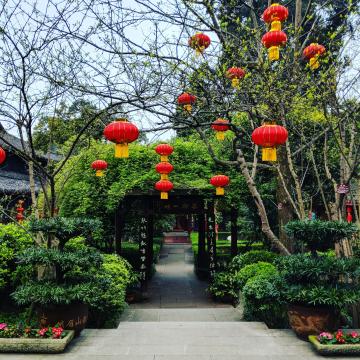Amid rapid urbanization, rural areas in China have undergone dramatic shifts. Nowhere is this more evident than in the Chengdu Plain in southwestern Sichuan province, where the thousands-year-old Linpan system is under threat.
 Linpan – which means “surrounded by woods” in Chinese – is a unique rural agricultural landscape, consisting of small villages surrounded by forests, rivers and farmland. The communities are known for their food productivity and high quality of life.
Linpan – which means “surrounded by woods” in Chinese – is a unique rural agricultural landscape, consisting of small villages surrounded by forests, rivers and farmland. The communities are known for their food productivity and high quality of life.
Like many areas in China, where urban centres are swallowing up the countryside, and where so many of the young people have left the rural areas for the cities in search for jobs, the Linpan are in decline.
According to an article in the journal Sustainability, the influence of large-scale urban construction on rural cultural land is marked by a growing number of threats. These include the: the loss of historical culture, local knowledge and traditional features; fragmentation of rural areas; depletion of natural resources with a variety of demands and uncoordinated economic growth; and disturbance of natural ecological processes and the loss of biodiversity.
But not is all lost. In an attempt to preserve a traditional way of life, Song Jianming returned to his hometown in Liujie, near the Sichuan city of Dujiangyan, to open the Pigpen Café, which was actually a pigpen on a Linpan that had been left idle for years.
“I left my hometown in search for jobs in the bigger cities when I was 18,” said Song, who comes from a family with limited means. “I worked many jobs, including as a construction worker, electrician, for 14 years, but at some point I started feeling nostalgic and decided to move back to the countryside.”
Before opening the Pigpen Café, Song already had some business experience, opening a hotpot restaurant in his hometown together with his wife in 2012. But then in 2016 he took part in a trip organized by the local government to learn about different rural village business models.
“That’s when I got the idea to open the café,” Song said. “I wanted to make something out of the pigpen to show the traditional farming culture of western Sichuan. That’s my childhood.”
With an initial investment of RMB 2 million ($300,000), he opened the café shortly after the trip in 2017.
 Today, the pigs are gone, as is the smell and muck. The troughs have been turned into flower pots and old, wooden barrels are used as stools. “I designed it all myself,” Song said with pride.
Today, the pigs are gone, as is the smell and muck. The troughs have been turned into flower pots and old, wooden barrels are used as stools. “I designed it all myself,” Song said with pride.
Next to the restaurant is a cultural centre that explains about local farming and offers traditional tea-making demonstrations. The café has become a popular destination, with visitors posting images of their experiences on social media (tagging #猪圈咖啡# or in pinyin #Zhu Juan Coffee#).
As a business, the café has been profitable, bringing in RMB 10 million ($1.4 million) in 2019, double from the previous year. And, it employs locals from 29 neighbouring villages who can make a decent salary of RMB 40,000 ($5,000) a year.
“The revitalization of the village must involve the local villagers,” Song said. “It is my dream to bring wealth not only to myself, but to all my neighbouring villagers and leave no one behind.”
The Pigpen Café is but one small example of boosting the local rural economies and paying homage to the social and environmental values of a once thriving traditional way of life.
“Here people can enjoy nature and take a break from their busy lives in the cities and get a taste of nostalgia, just like I did,” Song said.
The Pigpen Café and other initiatives like it show that the Linpan system is not dead and still has an important role to play in rural development in China.


